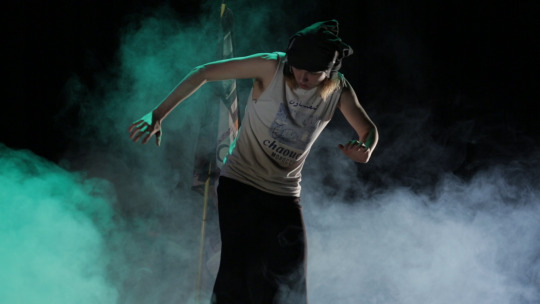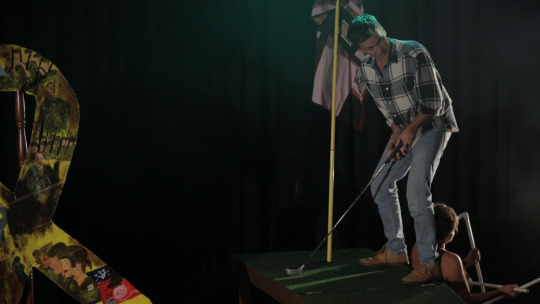#I just had to read the sentence ''queering the military industrial complex from the inside'' said in earnest
Text
The Plumbing Tree by Medium Judith

Sylvan Oswald on The Plumbing Tree
The queer family has a gas leak. A character named Miasma, the voice of the gas itself, narrates its encroaching occupation of what might be an ordinary household. But for Medium Judith, the collaborative experimental theater “host” entity of Amanda Horowitz and Bully Fae Collins, this oddball clan is under siege from within. This is the exhausted American Family Play as civic debacle – the kind in which poisoned water contaminates entire towns, and even air in some public housing is not safe to breathe. The queer theater of Medium Judith, posits that the family play itself may be unfit for consumption.
Polarized politics play out among the queer spawn of Celetta (Flannery Silva) in her pregnant-Orthodox-Jewish-matriarch drag. When the gender nonconforming Yves (Christiane Oyen) proposes a “dragabond” flag with “Islamic aesthetics” for the front lawn, his* sister Jodi, an androgynous nationalist in a pilgrim outfit (the subversively charming Julia Yerger), worries what the neighbors will think. As the argument ensues, the Homer Simpson-eque subletter Lars (Arne Gjelten) and neighbor Augustine (Elizabeth Sonenberg) weigh in. Jodi’s riposte is a shrine to female military veterans decoupaged onto a huge yellow ribbon. Yves fires back, planting his flag with such vigor that a pipe bursts, spewing septic ooze and vapors that put the family in a trance. “A character is best played in a less than conscious state,” intones Miasma as the existential front lawn drips with Shit. The Plumbing Tree is not just a battle over national/personal domestic politics, but over the soul of the well-made-play.
The latter may appear to be of less pressing urgency given our moment in history. However, the American Family Play has often functioned as a referendum on national shame. Whether the revelation is fraud, addiction, abuse, or beyond, our post-Freud playwrights have built structures that reveal the repressed. We can trace this from the likes of Arthur Miller and Lorraine Hansberry through newer plays like Paula Vogel’s And Baby Makes Seven (1993), Brandon Jacobs-Jenkins’s Appropriate (2013), Taylor Mac’s Hir (2014), and Jackie Sibblies-Drury’s Fairview (2018) (and many more – it’s a vast genre).
The Plumbing Tree critiques blind spots within the queer community, such as thinking of ourselves as part of “the solution,” to what ails society. If “perfection is for assholes,” as Taylor Mac says, then with our glorious deviance we hold a space of inclusion, acceptance, and process-as-constant. These are values queer folks ostensibly represent. Yet, Queer is no monolith. We cannot ignore that the white supremacy and institutional oppression that exist in society-at-large exist within our own communities – and our own non-profits as well. It’s all too easy to police the boundaries of otherness.
As the queer family onstage crawls over each other, out of their minds from Miasma’s attack, I saw one lost world inside another. But it didn’t feel like nostalgia. Medium Judith’s The Plumbing Tree ends with a rousing punk number. The cast wrinkles their noses, “and smells the audience as if they smell like shit.” We’re full of it. And it’s time to look it in the face.
*Medium Judith has informed me that the character Yves uses male pronouns while exploring transfemininity but does not yet formally identify that way.
Sylvan Oswald is an interdisciplinary artist who makes plays, texts, publications, and video. He is an Assistant Professor of Playwriting at UCLA’s School of Theater, Film & Television.

Fiona Duncan on The Plumbing Tree
I suffer from claustrophobia in elevators, relationships, discourse, and media. The first act of The Plumbing Tree had right wing vlogging, trans and queer worship, uncouth men as the butt of jokes—hyper contemporary hot topics in the U.S. I was raised in Canada, and in the last 3 years, have come to appreciate how subtly different our nations are, as I witness my age and same ideals proclaiming peers here, in the States, mostly incapable so far, in their shares at least, of imagining true collective difference; their politics tend to be reactionary in content and form (loud, advertorial me meme forms), which is fair-ish re: content (the powers that be are powerful and awful! it's hard out here). But, what if: she who opposes force with counterforce reinforces that which she opposes and is formed by it. Anyway, I was happy when The Plumbing Tree devolved into collective shit, figuratively and figurally. Sewage burst from below the set of the house, like colonial, industrial, and patriarchal history is beyond haunting us now. The stage was brown and mucky and its character all got puke and mad sick from a stink indifferent to their differing identities and ideals.
I refuse to talk about shit with most anyone. I don’t find poo jokes funny. You should leave the room if you’re going to fart. It’s my one prudery; notorious, friends make fun of me for it. And yet I loved The Plumbing Tree’s shit brown metaphor and set, something about it not being just my shit, or your shit, or their shit, but so much shit, a world of shit, made it less cringeworthy, embarrassing, disgusting. This shit was even, refreshing.
Fiona Alison Duncan is an LA-based Can-American writer, bookseller, and organizer. She is the organizing host of Hard to Read, a monthly lit series, and Pillow Talk, community organizing on sex, love, and communication.

Brian Getnick on The Plumbing Tree
For the last year and a half I’ve watched Amanda and Bully’s The Plumbing Tree grow at PAM, from an installation of sculptures and diagrams in the stairwell to public readings of the script and workshop productions of the play. At its recent debut at Highways Performance Space, The Plumbing Tree has blossomed and grown some very bitter fruit.
At Highways, the stage was littered with abstract brown assemblages, a quilted flag and an enormous yellow ribbon adorned with regiments of proud female soldiers. These objects are sculptures that pose as props. They don’t sit meekly in service of the plays narrative; their surfaces are worked with detailed, micro narratives of their own. And, because their material processes are explicit, they also function as psychological prosthetics of the characters that made them. The flag is meticulously quilted by non binary-artist Yves, the soldier ladies are crudely rendered in local color by Jodi, the neocon daughter.
I understood the cartoonishly frenzied energy of the performers as a way to grapple with the fact that the characters they played are more or less composites of ideological signs and symbols that Amanda and Bully have poetically strung together as a script. If one mistakes their competitions, attacks, and craft making with the complexity and paradoxical nature of being it is because we, in our daily rhythmic interface with social media, resemble them.
For instance, the mother, Celetta, wants only the signs and none of the burdens of motherhood: an engorged but hollow belly. Her children appeal to her dreamily as floating potentialities of her creative powers. Celetta: “I saw my children before they were born and they were smoke. And they could be anything.” Celetta resents that her actual children have abandoned their post inside the belly and are beside her warring for attention. In Act III, she pantomimes the agonies of birth to regain it.
When the language in The Plumbing Tree makes a shift away from parody and into a nearly autonomous materiality the characters release word torrents reminiscent of Asher Hartman and Reza Abdoh. This became most evident in the character Jodi, the Pilgrim hatted conservative. The polemics she espouses read like an Antifa passion play. Jodi: “Knock knock, who’s there?, Socialism, Socialism who? Socialism is a failed a system Shame on you America!” Then: “Fuck your faggot prophets. Here my hate has stewed me through. Prosper porridge, pungent forest sow and owl fertilize. Taste my musket, piggy squalor, measles mumps disease deceased repeat repent release your lands and logs in rolling throngs.” The language invites ecstatic interpretation, a song, a scream. It bursts through a parody of conservative rants and goes down, flung from Jodi’s mouth, into a witch’s cauldron.
In the third act, the performers crawl, they attack, they sing and dance, they blow a cluster of rape whistles and begin a chant. I remembered this line: “An object named is a fish out of water” It seemed to point to what the authors want and don’t want from writing for theater. I spoke with Amanda about this sentence and her answer was (I paraphrase here): that to name a thing is to isolate it from the force that gives the thing movement, agency, breath, and life. But these artists don’t write in a breath of fresh air; it’s a gamey fart that erupts when a flag is staked in the yard breaking open a subterranean sewer. At this rupture, the voice of the fumes bellows forth and the inhabitants that have piled out of the house indulge in a collective hallucination. The shit smell is named Miasma: all powerful language unleashed from the body.
Brian Getnick is an artist, curator and writer about contemporary performance in Los Angeles. He is the director of PAM Residencies, a showcase and residency program for performers making long form work (30+ minutes). He is the founder and co-director with Tanya Rubbak of Native Strategies, a journal documenting performance art in LA since 2011.

The Plumbing Tree happened at Highways on October 19 and 20, 2018.
Medium Judith is a host for an interdisciplinary methodology for writing experimental theater works. The company originated in 2012 in Baltimore, MD with works composed by Bully Fae Collins and Amanda Horowitz.
Video stills by Pete Ohs.
0 notes